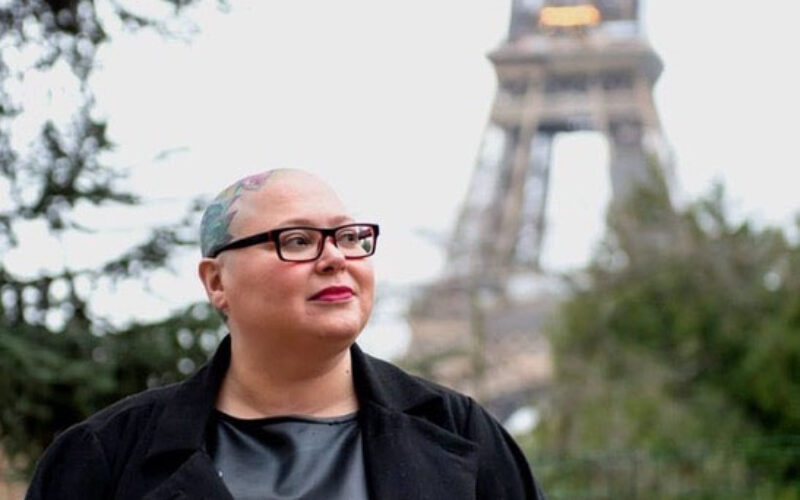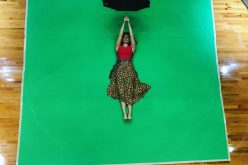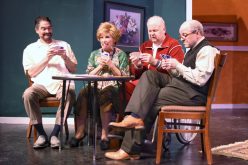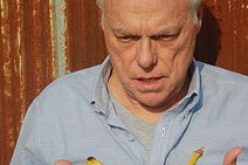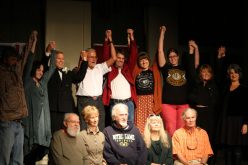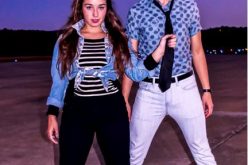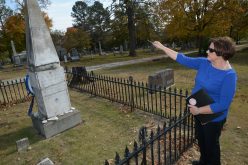MONICA HOOPER
mhooper@nwaonline.com
Arkansas native Jennifer Gibson’s “Dirt” explores the ecosystems within our soil and the Arkansas farmers and ranchers who are improving their operations to help the environment. The documentary, which was nominated for a Mid-America Emmy and a Public Media Award, will screen at 3 p.m. Oct. 14 at the Pryor Center on the Fayetteville square as part of this year’s Fayetteville Film Festival. Gibson will serve on the Women in Film Panel at 6 p.m. Oct. 13 in the Pryor Center.
Gibson took a few moments to answer some questions from The Free Weekly ahead of the Fayetteville Film Festival.
Q. What are the benefits for you when screening your documentary at a film festival?
A. It’s another avenue to reach people. This film in particular is trying to persuade people to care about the land, where our food comes from, and the people who farm it. I will take any opportunity to screen it. It is also a great opportunity for me to meet with and learn from other filmmaking professionals.
Q. What is the benefit of participating in a film festival is physically close to home?
A. Arkansans are my first and most important audience. I want to make sure these stories are shared to as many of them as possible. Local film festivals are also a great way to bring the local filmmaking community together and both celebrate the work being done in Arkansas and network and learn from each other.
Q. How did you go from kid in Arkansas to a filmmaker, podcaster and director?
A. I was raised in Russell (population 184) and went to Bald Knob Public Schools from preschool through graduation. I originally wanted to be a playwright, so I gathered some scholarships, grants and loans, and moved to New York City to attend New York University. On Sept. 11, 2001, I was a sophomore living close to the World Trade Center. The next days, weeks, and even months had a profound impact on me. The intensity of what every single human being around me was going through — the grieving, the wounded, the traumatized, the helpers, the heroes, the Muslims, the children — it all hit me that every single person has a story to tell. I wanted to tell those stories. I finally decided documentary filmmaking was the path for me.
Q. What are you looking forward to sharing during the Women in Film Panel?
A. I would like to bring up the difficulty women face in this industry in Arkansas specifically. I came back to Arkansas after getting my master’s from Columbia University Graduate School of Journalism and working in television and film in New York City for several years. I had a much more difficult time finding work here than in New York. Once I found myself inside the television industry here, I began to see that the issue is not only a lack of jobs but also barriers for women. We talk about women supporting women, but we also have to push men to support women and see them as hard-working, competent professionals, even in roles mostly filled by men.
Q. Tell me a little about your Brain Weasels podcast.
A. It’s been an experiment, but it’s primarily about mental health and the arts. I started this podcast last year as a way to share the stories and ideas of people with mental health issues here in Arkansas. We talk about the struggles and successes in our lives, the stigmas perpetuated by some pop culture, the positive and negative representations in the arts, and the artforms that help and heal. One episode about live-action role-playing (LARP) became pretty popular.
Q. I saw a little information about your tattoo collecting journey that is taking you all over the place. Can you share a little more about that project with me?
A. I have had alopecia since I was about 13 years old. It had been a source of pain and tears for over two decades. Then at 36 (I’m currently 41), I finally decided to stop feeling ashamed of this thing I can’t control and stop letting it control me. I have a friend who had started their tattooing career, and it fascinated me. I saw that it could help people feel a greater ownership of their bodies. It is a way to express yourself and to love yourself by putting art on skin. So, I decided to tattoo my head, and that’s what I did a day before my 37th birthday. Since then, I’ve fallen in love with the artform. My Instagram feed is almost entirely tattoo artists. I started researching and found artists I love all over the world. Then, I learned about tattourism, and suddenly two of my biggest loves and obsessions, travel and tattoos, became one.
Now, I am traveling and collecting tattoos while writing a book that is part memoir and part journalism about the tattoo industry and artists around the world. I am also in the development stage of a documentary about women tattoo artists around the world, and I might add trans and nonbinary artists to that if I can find the best way to do it justice. In a bittersweet transition, I will be leaving Arkansas PBS at the end of this year to fly away and finish my journey.
—
FAQ
Fayetteville Film Fest
WHAT — This year’s festival schedule is packed with screenings of 51 films, including five feature-length narrative films and three feature-length documentaries and will feature discussions and Q&A sessions with visiting filmmakers.
WHEN — Oct. 12-14
WHERE — The University of Arkansas Global Campus Theater and the Pryor Center on the Fayetteville town square
COST — All-Access VIP Passes at $80, Movie Lover’s Pass at $50, student passes at $25, and individual tickets from $5 to $8 each. The educational opportunities are free, and there will be some free screenings too.
INFO — www.fayettevillefilmfest.org
__
FYI
More On FFF
The Women in Film panel during the Fayetteville Film Festival is moderated by award-winning documentary filmmaker and television host Brooke Bierhaus of Bentonville at 6 p.m. Oct. 13.
Also joining Bierhaus and Gibson on the panel is award-winning writer and investigative journalist LaDonna Humphrey. Locals may remember her books, “The Girl I Never Knew” and “Strangled,” about the unsolved murder of Melissa Witt. She will screen her documentary “Uneven Ground” about her investigation in the unsolved case at 2 p.m. Oct. 13.
Vivian Kerr, an LA-based actor, writer, director, and producer will also serve on the panel. She screens her narrative feature film, “Scrap” at 7 p.m. Oct. 14.
Emily Railsback, co-owner of Burnt Sugar Productions, is a film director, producer and screenwriter based in Arkansas. Her narrative feature film, “American Parent,” will be screened at 4 p.m. Oct. 14 at Global Campus.

